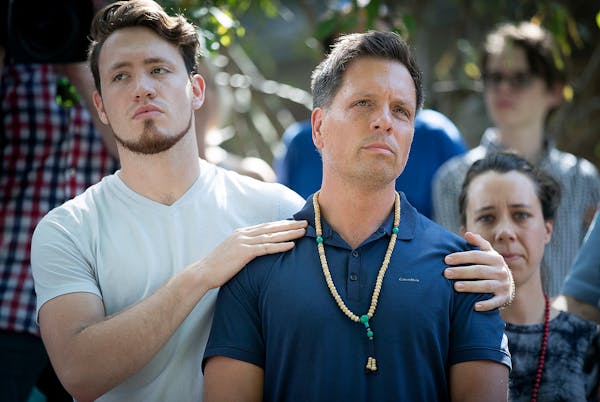The officer who shot and killed 40-year-old Justine Damond late Saturday apparently violated his department's rules on the use of body cameras when he failed to activate the device.
Damond had called 911 to report a disturbance and was in the alley behind her home when she met two officers, according to reports. The officers' body cameras were not turned on, and dashcam video from the officers' squad car did not capture the incident, according to the Bureau of Criminal Apprehension (BCA).
The Minneapolis Police Department's Policy and Procedure manual says that any use of force requires the camera's activation. If things change quickly and the officer is too busy, he or she should activate the camera "as soon as it is safe to do so," according to the manual.
The cameras constantly record a 30-second video buffer, a so-called "lookback" that allows officers to capture whatever happened in the half-minute before it's activated.
The BCA, which is investigating the shooting, said in a statement that it will be the Police Department's job to determine whether the officers violated the department's body camera policy. A police spokesman said Monday that the department had no comment on the officers' use of body cameras.
The American Civil Liberties Union (ACLU) on Monday called for penalties against officers who do not activate their cameras, saying the death of Justine Damond should have been recorded.
"This violation of policy thwarted the public's right to know what happened to Ms. Damond and why the police killed her," ACLU Interim Executive Director Teresa Nelson said in a statement.
She urged the BCA to release any audio recordings that might have been made by the officer's squad car dashcam.
Blong Yang, chairman of the Minneapolis City Council's Public Safety Committee, said that it would likely take a closer look at the department's body camera program at its meeting next week.
Members' attention was drawn by a KSTP report last week that said Minneapolis officers don't turn on their cameras as often as they should. The lack of bodycam footage of Saturday's shooting was also troubling, Yang said.
"It's concerning that the bodycams weren't on," he said.
Police Conduct Oversight Commission chairwoman Andrea Brown said that the oversight body had wanted officers to turn their body cameras on for all calls but that the department ignored their recommendation when the policy was adopted last year.
Officers currently have some discretion over when to record.
"That's what we recommended, that's what the public advocated for," said Brown, a Ramsey County public defender. Brown said that she has followed the Damond shooting closely and was troubled by the lack of video. The cameras "should be activated for all calls."
Asked Monday about the body cameras, Hennepin County Attorney Mike Freeman said, "I think they should be turned on. I do understand this, they were driving down an alley, the victim approached the car. That's not necessarily a time you must, but frankly I think it's a time you should."
matt.mckinney@startribune.com 612-673-7329
libor.jany@startribune.com 651-925-5033

Want to share info with the Star Tribune? How to do it securely

'Safe recovery sites' would offer syringes, naloxone and more to people using drugs. The plan could be in peril.
New Minnesota GOP leaders seek peace with party's anti-establishment wing

Who is Republican Lisa Demuth, Minnesota's first House speaker of color?

